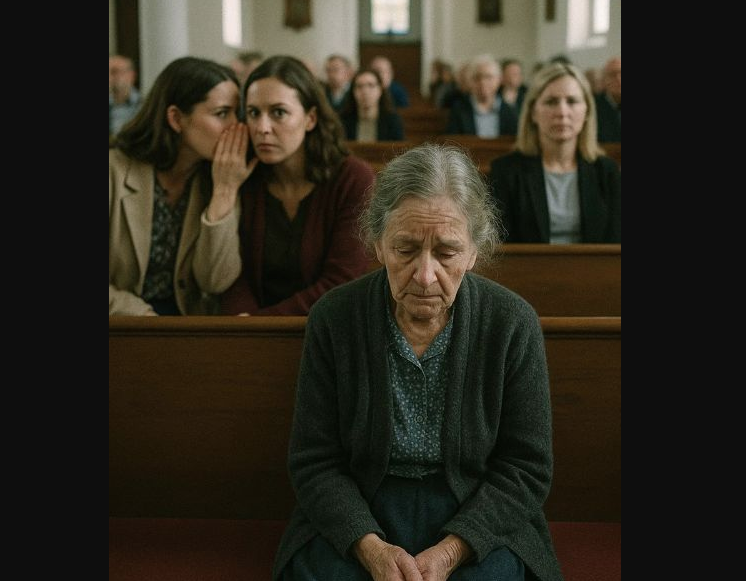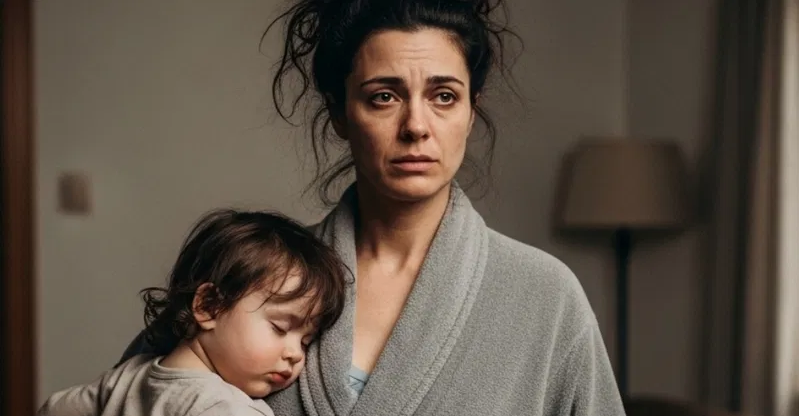She entered belatedly, during the initial hymn. She moved slowly along the aisle, slightly bent, clad in an aged black coat, clutching a well-worn Bible with tattered edges.
Instead of taking a seat near the front with the other families, she quietly slipped into the last pew.
A few regular attendees turned their heads and murmured.
“Never seen her here before.”
“She’s probably here for the complimentary coffee.”
“Bless her soul, but she’s in the wrong location. This is not a shelter.”
Someone even offered to guide her towards the community hall, assuming she was disoriented.
She gently declined. “I am precisely where I need to be. Thank you.”
During the sermon, she lowered her head and wept—silently, yet visibly. A few individuals exchanged uneasy glances. One woman leaned towards her husband and whispered, “Poor soul. She’s probably just lonely.”
When the communion concluded, the organist began to play the final hymn.
That’s when the side door softly creaked open.
The pastor—running behind schedule from a hospital visit—stepped into the sanctuary.
He surveyed the rows of pews.
Then his gaze settled upon the elderly woman in the very back.
And right there, in full view of the entire congregation, he halted mid-stride, removed his glasses, and uttered:
“You… you actually came.”
A profound silence descended upon the room.
Even the children ceased their restless movements. The organist’s fingers faltered, then became still. The old woman slowly lifted her head, her eyes gleaming with tears, and offered the pastor a small smile.
He walked directly past the pulpit, past the deacons and the choir, and proceeded down the aisle to the last pew.
“I truly didn’t think I would ever see you again,” he said, his voice barely steady.
She gently patted the seat next to her. “Sit, Ezra. It has been a very long time.”
The entire room remained motionless. The name Ezra had held little significance for them until that moment. Their pastor was always referred to as “Pastor Grayson.” No one had ever used his first name.
He sat beside her, his shoulders slumped like a child caught in a transgression.
“I am truly sorry,” he whispered.
The old woman nodded. “I forgave you many years ago.”
Someone near the front cleared their throat. A baby let out a cry. The organist glanced at the pianist, uncertain whether to resume playing.
Pastor Grayson slowly stood up and faced the congregation. “This… this is my mother.”
Gasps rippled through the room. An elderly man in the third pew leaned towards his wife. “I thought she had passed away.”
“So did I,” another person whispered.
The pastor nodded, as if hearing every hushed comment. “So did I.”
He looked down at his mother, then back at the stunned congregation. “I have told you all that I came from a difficult past. That I discovered faith when I was lost. But I never truly conveyed how profoundly lost I actually was.”
He paused, rubbing his hands together. “I departed from home when I was seventeen. I ran away. Angry, embittered. I believed I knew better. I thought the world owed me something. And when my father passed away two years later… I blamed her.”
He looked at the old woman, his eyes glistening. “I blamed you for everything.”
She nodded slowly. “I know, my son.”
“I would not respond to her letters,” he continued. “I discarded her birthday cards. I changed phone numbers, changed states, changed my identity. Not legally, but sufficiently. I did not want her to locate me.”
He turned to face everyone again. “I have preached about grace every Sunday. About forgiveness. About love. But for more than thirty years, I refused to forgive the one individual who never ceased loving me.”
The old woman reached out and gently took his hand. “You were a boy experiencing pain. And I never stopped praying that you would return.”
He turned to her, now unable to suppress his tears. “But instead of me coming back… you found me.”
She smiled, her face wrinkled but radiating warmth. “God operates in mysterious ways.”
A soft murmur of “Amen” emanated from somewhere in the room.
Pastor Grayson stepped back up to the pulpit, but his sermon bore no resemblance to what he had prepared.
Instead, he spoke about pride. About shame. About how effortlessly one can instruct others to be merciful while clinging to decades of personal anger.
He spoke from his very core, raw and unedited. And for the first time in years, people were not contemplating their lunch plans or whether the air conditioning was too cold.
They were leaning forward, captivated by his words.
At the conclusion, when the final hymn played once more, the old woman did not sit in the back. She stood by her son near the altar, holding his hand.
And no one whispered anymore.
After the service concluded, the old woman remained behind, quietly seated while people slowly filtered out.
One young couple approached her hesitantly. “Mrs. Grayson… we are so very glad you are here. Your son… he has helped us through a great deal.”
She smiled. “Please call me Margaret. And I am pleased he could assist you.”
More people came, one by one. An older woman brought her a cup of tea. A teenage boy with Down syndrome presented her with a drawing he had created during the service. Even the gossipy lady from the third row extended a hug.
By the time the church emptied, Margaret had a lap filled with thank-you notes and a dozen handshakes.
Later that afternoon, Ezra took his mother home. Not to a hotel, not to a shelter—but home.
He offered her his guest room, but she gently shook her head.
“Allow me to sleep on the couch,” she said. “It will be closer to the sound of your voice when you read scripture in the morning.”
He smiled, recalling how she used to read to him by candlelight when the electricity failed.
They remained awake late that night. He prepared her chamomile tea and listened as she recounted stories from the years he had missed—about his cousin Anthony getting married, about the dog he had left behind living to be fifteen, about a drawer full of letters she had never sent.
He finally posed the question he had been avoiding all day. “Why now? Why did you come today, of all days?”
She sipped her tea. “I received a letter.”
He blinked. “From whom?”
“Your church,” she said, gently setting the cup down. “A young woman named Tasha. She mentioned you helped her after her husband passed away. She included your name. Your sermon. She said you reminded her of someone I used to speak about. She even enclosed a photograph from the Easter service.”
Ezra remembered Tasha—she had lost her husband in a car accident just three months prior. He had visited her weekly.
“I did not realize she knew my history,” he said.
“God knew,” Margaret replied.
Over the subsequent weeks, news of the reunion spread throughout the community. Church attendance increased. People came not solely for the sermons, but to meet “the woman in the black coat.”
Margaret began assisting in the soup kitchen. She sang softly during Wednesday night prayers. Children affectionately called her “Granny Mags.”
And Pastor Grayson—Ezra—appeared lighter. Happier. More authentic.
One Sunday, during announcements, he uttered something that caused the room to fall silent once more.
“I have requested my mother to co-lead a new series on forgiveness. Not merely because she forgave me. But because I believe she possesses wisdom to impart to all of us.”
Margaret shook her head, feeling a touch of embarrassment. “I am no public speaker.”
“You do not have to be,” he said. “You simply have to appear.”
She did.
And people listened intently.
One woman, June, had not communicated with her daughter in twelve years. After hearing Margaret’s story, she picked up the telephone.
A man named Clay forgave his brother for embezzling money years ago.
Even the gossipy lady in the third row ceased talking about others—at least, not in her previous manner.
Then, one crisp morning in October, Margaret did not come to church.
Ezra found her in the guest room, her Bible still open beside her.
She had passed away peacefully in her sleep.
The entire town attended the funeral. People Margaret had never met lit candles in her honor. The teenager with Down syndrome drew her with wings. A bench in front of the church was dedicated in her memory—with a small plaque that read:
“She came in quietly, but she left with all our hearts.”
After the burial, Ezra stood beside her grave, his hands trembling.
“She found me,” he told the small gathering. “When I didn’t even realize I was still lost.”
He looked up at the sky, sunlight piercing through the clouds.
“And she reminded me—and perhaps all of us—that it is never too late to forgive. Never too late to come home.”
Some people wept. Others smiled through their tears.
Back at the church, during lunch, a young boy asked Ezra, “Pastor… will we see her again?”
He knelt beside the boy. “One day, I believe we will.”
The boy nodded. “Then I will wait.”
And with that, the whispers finally transformed.
Not about coats or coffee or whether someone appeared out of place.
But about second chances.
And how sometimes, the ones we forget are the ones who never forgot us.




